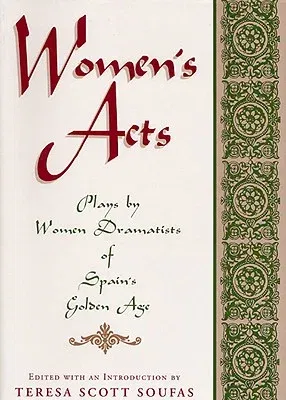Seventeenth-century Spain witnessed a rich flowering of dramatic
activity that paralleled the Renaissance stage in other European
countries. Yet this Golden Age traditionally has been represented in
print almost entirely by male playwrights. With Women's Acts, Teresa
Scott Soufas makes available eight plays by five long-neglected women
dramatists: Angela de Azevedo, Ana Caro Mallen de Soto, Leonor de la
Cueva y Silva, Feliciana Enriquez de Guzman, and Marla de Zayas y
Sotomayor.
In an age when moralists denounced women's participation in the public
arena, these women transgressed traditional gender ideology by creating
works for the secular stage. Female characters in their plays portray
the contradictions in their society's expectations for women. Ranging
from an empress whose unmarried state distresses her subjects, to a
woman who adopts male behavior patterns in courtship, and another who
must dress like a man in order to be heard in court, female characters
show how difficult it was for women to find fulfillment during a time
when their opportunities were limited.
In her introduction, Soufas reviews the development of sixteenth- and
seventeenth- century Spanish drama while focusing on the position of
women during this period, the significance of these plays, and the
issues the playwrights address. Each dramatist's section opens with an
overview of the author's life and professional activity, a synopsis of
her work(s), and a selected bibliography.
In a modernized edition that is consistent, readable, and suitable for
use by both students and scholars, the plays in Women's Acts will at
last earn their rightful place in the canon of Renaissance drama.

